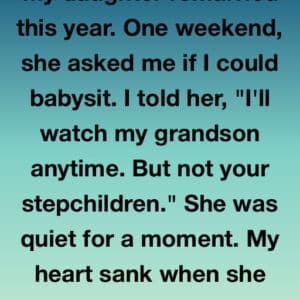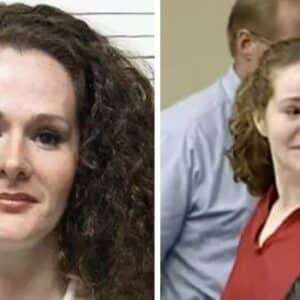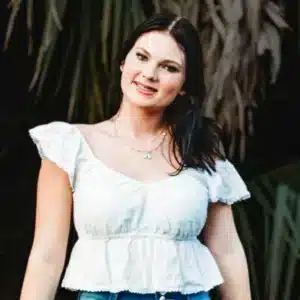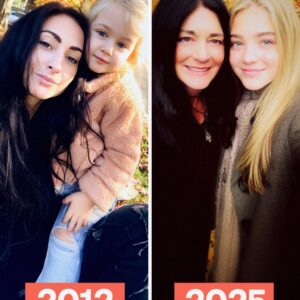My son changed almost overnight. One day he was joking with me in the kitchen; the next he could barely look at me. He grew sharp, distant, and cold. Whenever I tried to talk to him, he snapped, “Back off.” When I asked my wife what was going on, she stayed painfully silent. And when he excluded me from his graduation party—the moment every parent dreams of—something inside me cracked.
Still, I tried to respect his space. Tried to tell myself it was just a teenage phase. But the worry ate at me, and one night I stepped into his room while he was showering. I shouldn’t have done it. But I was a father with no answers and a heart full of fear.
It wasn’t the clean room that startled me—it was the emptiness. Bare walls. No posters. Everything folded and arranged like a temporary guest lived there, not my son. That kind of precision didn’t belong to a 17-year-old boy.
Then I noticed his backpack. The zipper was slightly open.
Inside was the photograph that shattered me. A picture of the two of us on a fishing trip when he was ten—our favorite story to tell. He had burned the edges. The smiling image of me in the middle was untouched, but the border was blackened, curling inward.
It felt like he was burning the past. Burning me.
I put it back exactly as I found it and left his room in silence, carrying a new kind of ache that words couldn’t soften.
That night, lying beside my wife, I asked again, “Do you know what’s going on?”
She closed her eyes and whispered, “I promised him I wouldn’t tell.”
My whole body went cold. “You what?”
“He asked me not to. He said it was temporary. Please… don’t be angry.”
But I was angry—at the betrayal, at the secrecy, at the fear twisting in my stomach. How could she choose silence when our son was clearly falling apart?
But the next day, everything changed.
I went to the school, desperate for answers. His counselor’s face paled when she saw me.
“Mr. Dorian… I assumed you already knew.”
“Knew what?”
She hesitated. “That Liam has been undergoing treatment. He’s been on a reduced schedule because of chemotherapy.”
The room tilted. “Chemotherapy?”
She nodded gently. “He asked us not to tell you. He didn’t want you to worry.”
I couldn’t speak. My throat closed and my heart pounded in my ears.
He didn’t want me to worry?
He was a child. My child. And he was fighting cancer alone.
I drove home on autopilot, tears blurring everything. When I saw him that evening, really saw him—his pale face, his weight loss, the way he carried himself—I realized the signs had been there all along. But I’d been so wrapped in confusion, I’d missed the truth.
Late that night, after hours of sitting in the dark, I went to my wife.
“Is it true?” I asked, my voice breaking.
She nodded, crying. “He wanted to protect you. He said if you knew, you’d lose yourself trying to save him.”
He thought I’d break. He thought he had to shield me. And so he pushed me away, burned our photo, and built a wall to keep me out.
But I wasn’t about to let him face this alone.
He didn’t want me at his graduation party. He wanted me protected from the pain. But I showed up anyway.
When he saw me walk into the backyard, his face froze. His friends fell silent. The music kept going, awkward and loud.
He walked toward me with fear in his eyes. “Why are you here?”
“I found the photo,” I said softly. “And then I found out.”
His shoulders fell, and for the first time in months, he looked like a frightened kid instead of a hardened teenager.
“You weren’t supposed to know,” he whispered.
“You didn’t want me to hurt,” I said. “But I’m your dad. The only place I belong is right next to you.”
He started crying before I even reached him. I pulled him into my arms, and he melted, trembling against my chest. Months of fear and pain spilled out.
His friends quietly stepped away. My wife stood on the porch wiping tears.
That was the moment everything shifted.
From then on, I became part of his fight. Every treatment, every appointment, every hard day. The burned photo wasn’t a rejection—it was a desperate attempt to erase something he thought would make him weak.
Slowly, he let me in. Slowly, he healed.
And three months after finishing chemo, the doctor told us the words we prayed for:
“Clear scans.”
We all cried—right there in the cold, too-bright exam room. Nurses smiled. Liam shook with relief.
Healing took time. His strength came back piece by piece. He started painting again. Started talking. Started laughing.
A year later, on Father’s Day, he handed me a gift: a journal with twelve letters inside. One for every month he’d pushed me away.
They were full of fear, guilt, confusion, love. The last letter ended with:
“Thank you for breaking into my room. Thank you for not backing off. Thank you for showing up.”
That fishing photo—unburned, reprinted, framed—now hangs in my office.
And every year, he gives me a new letter. Proof that love, even in silence, still breathes.
If someone you love is pushing you away, don’t give up too quickly. Sometimes, distance hides the deepest pain. And sometimes, the ones who shout “leave me alone” are the ones who need you standing right beside them.
Love is quiet. Love is patient. Love refuses to walk away.
And love—real love—shows up.





